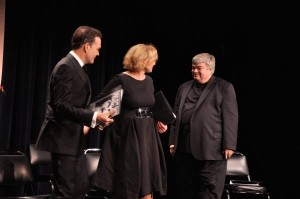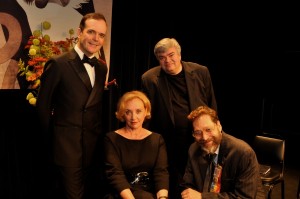 Project Shaw, which puts on monthly staged readings of the plays of George Bernard Shaw, presented Village Wooing, a 1933 “comedietta for two voices,” at Symphony Space on Monday night. The production, directed by David Staller, Project Shaw’s resident mastermind, featured Jefferson Mays, who is currently starring on Broadway in A Gentleman’s Guide to Love and Murder, and J. Smith-Cameron, who starred in the Irish Repertory Theatre’s universally admired 2013 revival of Juno and the Paycock and now appears on Rectify. Also on hand was a narrator who read Shaw’s stage directions out loud for the benefit of the audience. That was me.
Project Shaw, which puts on monthly staged readings of the plays of George Bernard Shaw, presented Village Wooing, a 1933 “comedietta for two voices,” at Symphony Space on Monday night. The production, directed by David Staller, Project Shaw’s resident mastermind, featured Jefferson Mays, who is currently starring on Broadway in A Gentleman’s Guide to Love and Murder, and J. Smith-Cameron, who starred in the Irish Repertory Theatre’s universally admired 2013 revival of Juno and the Paycock and now appears on Rectify. Also on hand was a narrator who read Shaw’s stage directions out loud for the benefit of the audience. That was me.
While this wasn’t my first Project Shaw gig, it was the first time that I’d appeared on stage with just two other people—and what people! If you’ve read what I’ve written about Mays and Smith-Cameron in The Wall Street Journal, you’ll know that I consider them to be two of the very best actors in America, or anywhere else. When David asked me to take part in Village Wooing, the thought briefly occurred to me that to say yes would thus be inviting first-degree embarrassment, seeing as how I’m the furthest thing from an actor. But I figured that it’d be worth suffering any amount of embarrassment in return for the opportunity to watch them work up close, so I took a very deep breath and accepted his invitation.
It won’t surprise any regular playgoer to hear that my colleagues acquitted themselves stupendously well in Village Wooing, enough so that we all admitted to dreaming of the possibility that they might someday co-star in a fully staged production of Shaw’s poignant one-act comedy about a shipboard encounter and its surprising aftermath. As far as I’m concerned, though, the real show took place at the four-hour rehearsal for Monday’s performance. It was bewitching to watch two such brilliantly intelligent actors seize hold of the root of the theatrical matter with breathtaking quickness.
 As for me, I wasn’t nervous, just excited, perhaps because I didn’t have all that much to do. Whatever the reason, I read my lines as efficiently and effectively as I could, and the rest of the time I just sat there and goggled, both at the rehearsal and at the performance. I’m not sure I was supposed to laugh in front of the audience, but I couldn’t help myself. I told J. (that’s what she’s called) that performing with her felt like taking a ride in a self-driving car that did all the work for me, which made her giggle.
As for me, I wasn’t nervous, just excited, perhaps because I didn’t have all that much to do. Whatever the reason, I read my lines as efficiently and effectively as I could, and the rest of the time I just sat there and goggled, both at the rehearsal and at the performance. I’m not sure I was supposed to laugh in front of the audience, but I couldn’t help myself. I told J. (that’s what she’s called) that performing with her felt like taking a ride in a self-driving car that did all the work for me, which made her giggle.
After the show she introduced me to her husband, Kenneth Lonergan, the author of This Is Our Youth, Lobby Hero, and The Starry Messenger and the writer-director of Margaret and You Can Count on Me. I stammered something extravagantly admiring, he said something properly gracious, and I went on my bedazzled way.
The theater has given me many thrills in the course of my eleven-year run as a drama critic, opera librettist, and (most recently) playwright, enough that I wouldn’t want to try to rank them. That said, I have no doubt that I’ll long remember Village Wooing as one of the biggest and best.
